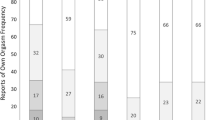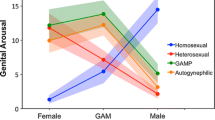Abstract
An individual’s level of interpersonal dependency influences the way they engage with others, and researchers have achieved a comprehensive understanding of the interplay between dependency and interpersonal relationships across an array of social situations. This knowledge has improved the efficacy of medical and psychotherapeutic work with dependent clients and has informed approaches taken to reduce the societal costs of dependent personality disorder (e.g., increased risk for suicide and self-harm, perpetration of child abuse, perpetration of domestic violence, victimization by a partner, and physical illness). Relatively little research, however, has explored dependency’s links to sexual activity and sexual functioning, the findings of which stand to offer knowledge valuable to sex counseling, couples therapy, sexual health, and our overall understanding of sexuality. The current study utilized a multimethod research design to explore dependency as it relates to sexual and romantic relationships and sexual activity. Multiple associations emerged between dependency, both interpersonal dependency and a healthy variant of dependency, and sexual activity. Based upon these findings and contemporary literature, an initial discussion of some of the therapeutic implications of this knowledge and suggestions for working with dependent clients are offered.
Similar content being viewed by others
References
Bader, M. (2009). Male sexuality: Why women don’t understand it–and men don’t either. Lanham, MD: Rowman and Littlefield Publishers.
Blunt-Vinti, H., Jozkowski, K. N., & Hunt, M. (2019). Show or tell? Does verbal and/or nonverbal sexual communication matter for sexual satisfaction? Journal of Sex and Marital Therapy, 45, 206–217.
Bornstein, R. F. (1992). The dependent personality: Developmental, social, and clinical perspectives. Psychological Bulletin, 112, 3–23.
Bornstein, R. F. (1993). The dependent personality. New York: Guilford Press.
Bornstein, R. F. (1996). Construct validity of the Rorschach Oral Dependency Scale: 1967–1995. Psychological Assessment, 8, 200–205.
Bornstein, R. F. (1998). Depathologizing dependency. Journal of Nervous and Mental Disease, 186, 67–73.
Bornstein, R. F. (1999). Criterion validity of objective and projective dependency tests: A meta-analytic assessment of behavioral prediction. Psychological Assessment, 11, 48–57.
Bornstein, R. F. (2005). The dependent patient: Diagnosis, assessment, and treatment. Professional Psychology: Research and Practice, 36, 82–89.
Bornstein, R. F. (2006). The complex relationship between dependency and domestic violence. American Psychologist, 61, 595–606.
Bornstein, R. F. (2012). From dysfunction to adaptation: An interactionist model of dependency. Annual Review of Clinical Psychology, 8, 291–316.
Bornstein, R. F., Geiselman, K. J., Eisenhart, E. A., & Languirand, M. A. (2002). Construct validity of the Relationship Profile Test: Links with attachment, identity, relatedness, and affect. Assessment, 9, 373–381.
Bornstein, R. F., & Huprich, S. K. (2006). Construct validity of the Relationship Profile Test: Three-year retest reliability and links with core personality traits, object relations, and interpersonal problems. Journal of Personality Assessment, 86, 162–171.
Bornstein, R. F., Krukonis, A. B., Manning, K. A., Mastrosimone, C. C., & Rossner, S. C. (1993). Interpersonal dependency and health service utilization in a college student sample. Journal of Social and Clinical Psychology, 12, 262–279.
Bornstein, R. F., & Languirand, M. A. (2003). Healthy dependency. New York: Newmarket.
Bornstein, R. F., & Masling, J. M. (2005). The Rorschach oral dependency scale. In R. F. Bornstein & J. M. Masling (Eds.), Scoring the Rorschach: Seven validated systems (pp. 135–157). Mahwah, NJ: Lawrence Erlbaum Associates.
Bornstein, R. F., Masling, J. M., & Poynton, F. G. (1987). Orality as a factor in interpersonal yielding. Psychoanalytic Psychology, 4, 161–170.
Bornstein, R. F., Porcerelli, J. H., Huprich, S. K., & Markova, T. (2009). Construct validity of the Relationship Profile Test: Correlates of overdependence, detachment, and healthy dependency in low income urban women seeking medical services. Journal of Personality Assessment, 91, 537–544.
Bornstein, R. F., Rossner, S. C., & Hill, E. L. (1994). Retest reliability of scores on objective and projective measures of dependency. Journal of Personality Assessment, 62, 398–415.
Bosson, J. K., Swann, W. B., & Pennebaker, J. W. (2000). Stalking the perfect measure of implicit self-esteem: The blind men and the elephant revisited? Journal of Personality and Social Psychology, 79, 631–643.
Cicchetti, D. V. (1994). Guidelines, criteria, and rules of thumb for evaluating normed and standardized assessment instruments in psychology. Psychological Assessment, 6, 284–290.
Clarkin, J. F., Caligor, E., Stern, B. L., & Kernberg, O. F. (2004). Structured Interview of Personality Organization (STIPO). Unpublished manuscript, Personality Disorders Institute, Weill Medical College of Cornell University.
Gordon, R. L. (1975). Interviewing: Strategy, techniques and tactics. Homewood, IL: Dorsey Press.
Herbenick, D., Eastman-Mueller, H., Fu, T. C., Dodge, B., Ponander, K., & Sanders, S. A. (2019). Women’s sexual satisfaction, communication, and reasons for (no longer) faking orgasm: Findings from a U.S. probability sample. Archives of Sexual Behavior, 48, 2461–2472.
Kernberg, O. F. (1984). Severe personality disorders. New Haven, CT: Yale University Press.
Kleinplatz, P. J., Ménard, A., Paquet, M. P., Paradis, N., Campbell, M., Zuccarino, D., & Mehak, L. (2009). The components of optimal sexuality: A portrait of “great sex.” Canadian Journal of Human Sexuality, 18(1–2), 1–13.
Marshall, T. C., Bejanyan, K., & Ferenczi, N. (2013). Attachment styles and personal growth following romantic breakups: The mediating roles of distress, rumination, and tendency to rebound. PLoS ONE, 8, e75161. https://doi.org/10.1371/journal.pone.0075161.
Masling, J. M. (1986). Orality, pathology, and interpersonal behavior. In J. Masling (Ed.), Empirical studies of psychoanalytic theories (Vol. 2, pp. 73–106). Hillsdale, NJ: Lawrence Erlbaum Associates.
Masling, J. M., Rabie, L., & Blondheim, S. H. (1967). Obesity, level of aspiration, and Rorschach and TAT measures of oral dependence. Journal of Consulting Psychology, 31, 233–239.
Masters, W. H., & Johnson, V. E. (1976). Principles of the new sex therapy. American Journal of Psychiatry, 133, 548–554.
McDonald, R. (1999). Test theory: A unified treatment. Mahwah, NJ: Lawrence Erlbaum Associates.
Mihura, J. L., Meyer, G. J., Dumitrascu, N., & Bombel, G. (2013). The validity of individual Rorschach variables: Systematic reviews and meta-analyses of the comprehensive system. Psychological Bulletin, 139, 548–605.
Natoli, A. P., & Bornstein, R. F. (2017). Integrative assessment of interpersonal dependency: Contrasting sex differences in response patterns on self-attributed and implicit measures. Journal of Projective Psychology and Mental Health, 24, 26–33.
Nosek, B. A., Greenwald, A. G., & Banaji, M. R. (2005). Understanding and using the Implicit Association Test: II. Method variables and construct validity. Personality and Social Psychology Bulletin, 31, 166–180.
Overholser, J. C., & Fine, M. A. (1994). Cognitive-behavioral treatment of excessive interpersonal dependency: A four-stage psychotherapy model. Journal of Cognitive Psychotherapy, 8, 55–70.
Perry, J. C. (1989). Dependent personality disorder. In T. Karasu (Ed.), Treatments of psychiatric disorders (pp. 2649–2659). Washington, DC: American Psychiatric Association.
Raposo, S., Impett, E. A., & Muise, A. (2020). Avoidantly attached individuals are more exchange-oriented and less communal in the bedroom. Archives of Sexual Behavior, 49, 2863–2881.
Schapiro-Halberstam, S., & Josephs, L. (2018). Unkosher sex: Vulnerable narcissism and ultra-Orthodox Jewish men. Journal of Sex and Marital Therapy, 44, 679–686.
Sprecher, S. (2001). Equity and social exchange in dating couples: Associations with satisfaction, commitment, and stability. Journal of Marriage and Family, 63, 599–613.
Sussman, S. (2010). Love addiction: Definition, etiology, treatment. Sexual Addiction and Compulsivity, 17, 31–45.
Funding
Funding for this research has been provided by the Fund for Psychoanalytic Research through the American Psychoanalytic Association and by a Student Research Grant from the Society for Personality Assessment (to A. Natoli). For the remaining authors no financial interest or benefit was declared.
Author information
Authors and Affiliations
Corresponding author
Ethics declarations
Conflict of interest
The authors declare that they have no conflict of interest.
Ethical Approval
All procedures performed in studies involving human participants were in accordance with the ethical standards of the Institutional Review Board of Adelphi University and are consistent with the principles of research ethics published by the American Psychological Association and with the 1964 Helsinki Declaration and its later amendments or comparable ethical standards.
Informed Consent
Informed consent was obtained from all individual participants included in the study.
Additional information
Publisher's Note
Springer Nature remains neutral with regard to jurisdictional claims in published maps and institutional affiliations.
Rights and permissions
About this article
Cite this article
Natoli, A.P., Schapiro-Halberstam, S. & Kolobukhova, A. A Multimethod Investigation of Sex, Romantic Relationships, and Interpersonal Dependency. Arch Sex Behav 50, 2621–2629 (2021). https://doi.org/10.1007/s10508-021-01932-x
Received:
Revised:
Accepted:
Published:
Issue Date:
DOI: https://doi.org/10.1007/s10508-021-01932-x




